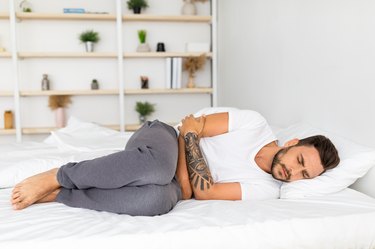

You plop on the couch or into bed after a long day ready to relax. But once you're on your back, your stomach starts to hurt. What's going on?
Lying down doesn't typically cause or worsen most stomach problems, says Babak Firoozi,MD, a board-certified gastroenterologist at MemorialCare Orange Coast Medical Center in Fountain Valley, California.
Video of the Day
Video of the Day
That said, there are certain conditions where your position can make a difference. Keep reading to learn more about lower abdominal pain when reclining.
1. You Have Acid Reflux or GERD
Lying down after a big meal can easily worsen acid reflux or gastroesophageal reflux disease (or GERD, which is frequent reflux). "When a person lies down, the chances of the stomach contents refluxing into the esophagus goes up because you don't have the benefit of gravity," Dr. Firoozi says. (GERD could also be to blame if you're waking up with stomach pain.)
You might notice a burning sensation in your stomach, chest or throat or have sour-tasting food or liquids backwash into your throat, per the Cleveland Clinic. Over time, GERD can also cause a sore throat, chronic coughing or a feeling like there's a lump in your throat.
Fix It
You can reduce your odds of reflux at night by eating earlier in the evening. "Try to have your last meal at least four hours before going to bed," Dr. Firoozi says. Propping your head up with a pillow, avoiding trigger foods like tomatoes and spicy dishes and taking an over-the-counter antacid can help, too.
2. You're Gassy or Bloated
There are lots of things that can cause gas and bloating, including eating more fiber than you're used to and drinking carbonated beverages or even too much water. But no matter the underlying culprit, lying on your back can make the problem worse.
"When you lie down face up, it's possible that you don't have the benefit of your abdominal muscles helping to force and push the gas out," Dr. Firoozi says.
Fix It
If your gas tends to get worse when you lie down on your back, try changing positions. "Lying on your stomach can help. The idea is it may help put more pressure on your abdomen, making it easier to expel the gas," Dr. Firoozi says. Bringing your knees up to your chest can also give you some relief.
3. You Could Have IBS or IBD
If you have a GI condition that makes you more prone to gas, like irritable bowel syndrome (IBS) or an inflammatory bowel disease (IBD) like Crohn's disease or ulcerative colitis, you might also notice that the problem gets worse from lying down, Dr. Firoozi says.
Other common IBS symptoms include abdominal cramping, diarrhea and constipation, per the Mayo Clinic. IBD symptoms may be more severe and can include abdominal pain and cramping, reduced appetite, fatigue, bloody stool or unintended weight loss, according to the Mayo Clinic. These can happen at any time though, not just when you're lying down.
Fix It
You might be able to get rid of the gas more quickly by lying on your stomach. A regular yoga practice has also been shown to help ease IBS-related gas, according to a December 2016 study in Clinical Gastroenterology & Hepatology. Poses like wind-relieving pose, child's pose and happy baby are easy to do when you're lying down in bed.
That said, you should see your gastroenterologist if you think your gas is caused by IBS or IBD. Inflammatory bowel diseases typically need to be controlled with prescription medications, like biologics. Certain medications, dietary modifications and lifestyle changes can also help control IBS symptoms.
4. You Pulled a Stomach Muscle
If your stomach hurts but you're not sick, you may have a muscle problem. You can strain or pull a muscle in your abdominal wall from an accident or fall, sudden twisting, lifting a heavy object or even excessive coughing or sneezing, according to the Cleveland Clinic.
The soreness or aching often gets worse when you cough or engage in vigorous activity. Sometimes it's also more noticeable when you're in certain positions, including lying down, Dr. Firoozi says.
Fix It
A pulled stomach muscle usually gets better on its own with rest. You can speed the process along and soothe your discomfort by applying ice to the affected area, taking an over-the-counter pain reliever like ibuprofen or wearing an abdominal brace to keep your stomach muscles supported, per the Cleveland Clinic.
5. You Might Have Pancreatitis
Pancreatitis, or an inflamed pancreas, typically occurs from excessive alcohol use or gallstones. It can cause severe stomach pain that radiates toward the back or the chest, and it might feel worse when you lie down.
"The pancreas sits a little farther back on the abdomen. If you're lying down, an inflamed pancreas would press on your spine and cause pain," Dr. Firoozi says.
Other pancreatitis symptoms include nausea, vomiting, a rapid heart rate, fever, swelling or tenderness in your upper abdomen and yellow skin or eyes, according to Johns Hopkins Medicine.
Fix It
Seek medical attention if you think you could have pancreatitis. The condition is typically treated with antibiotics and a bland or clear diet, per Johns Hopkins Medicine. In the meantime, you can get some immediate pain relief by sitting up, which takes pressure off of your spine, Dr. Firoozi says.
When to See a Doctor
Persistent abdominal pain, no matter what your position, is usually a sign of an underlying condition, Dr. Firoozi says. You should let your doctor know if your stomach pain isn't easing up after a few days, or if you're experiencing symptoms including:
- Fever that lasts for more than a day or two
- Nausea or vomiting that lasts for more than a day or two
- Blood in your stool, urine or vomit
- Abdominal swelling or tenderness
- Yellowing of the eyes or skin
- Pain in other parts of the body
- Shortness of breath
- Cleveland Clinic: "Acid Reflux & GERD"
- Mayo Clinic: "Irritable Bowel Syndrome"
- Mayo Clinic: "Inflammatory Bowel Disease"
- Clinical Gastroenterology & Hepatology: "Effect of Yoga in the Therapy of Irritable Bowel Syndrome: A Systematic Review"
- Cleveland Clinic: "Abdominal Muscle Strain"
- Johns Hopkins Medicine: "Pancreatitis"
Was this article helpful?
150 Characters Max
0/150
Thank you for sharing!
Thank you for your feedback!
Is this an emergency? If you are experiencing serious medical symptoms, please see the National Library of Medicine’s list of signs you need emergency medical attention or call 911.